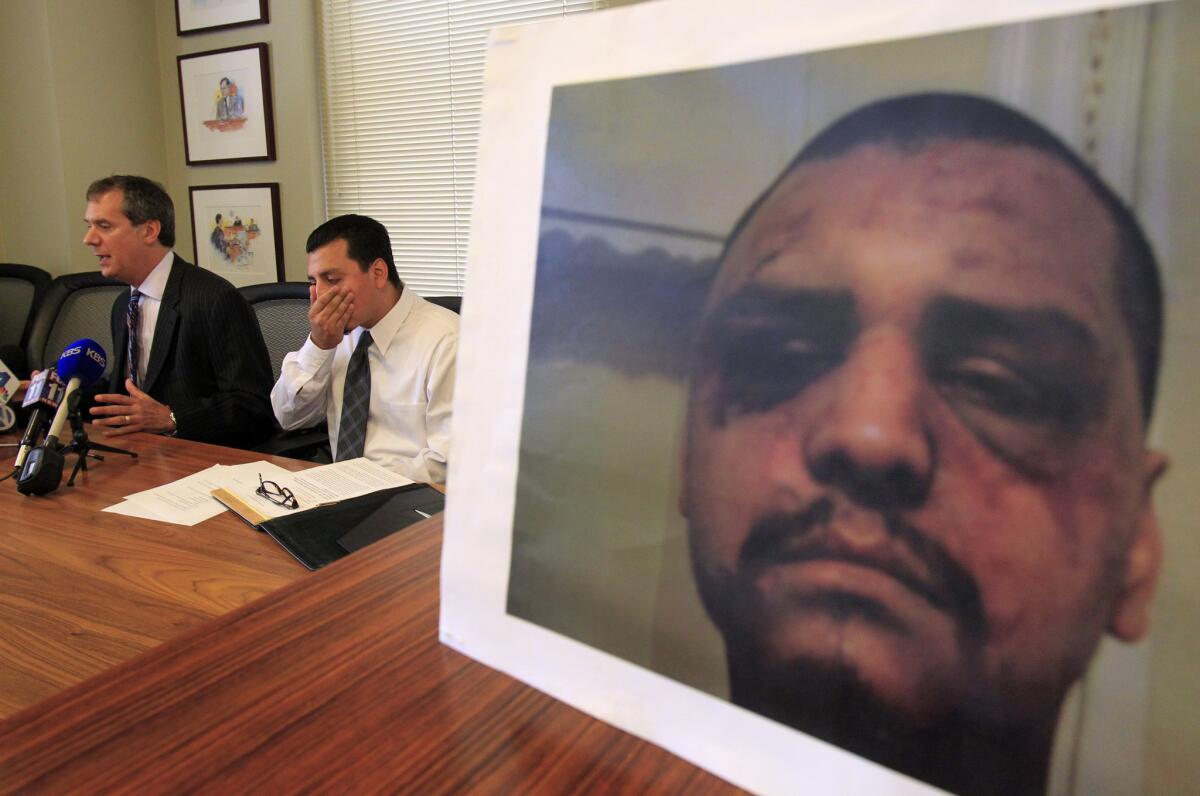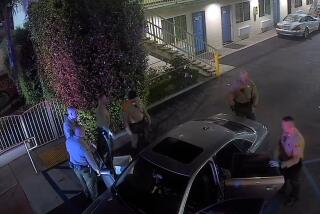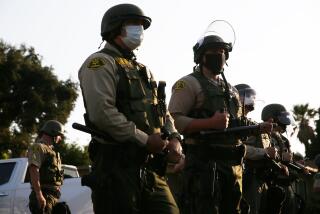Ex-L.A. County sheriff’s sergeant sentenced to 8 years in prison in jail visitor beating

Gabriel Carrillo listens in May 2014 to attorney Ronald Kaye, next to a picture of Carrillo’s face after an encounter with Los Angeles County sheriff’s deputies.
Former Los Angeles County Sheriff’s Sgt. Eric Gonzalez made a final, defiant stand Monday as a judge prepared to sentence him in the beating of a handcuffed man and a scheme to cover it up.
In making his case for leniency, Gonzalez said his job in the Los Angeles County jail was filled with danger and praised himself for showing restraint. He sat down without apologizing.
Then Gabriel Carrillo stood to speak.
He called Gonzalez’s request for a light sentence “a joke,” and described how a jail visit to his brother upended his life when he was beaten and then falsely accused of attacking deputies.
“He made his bed,” Carrillo said. “Now he needs to lay in it.”
The judge agreed, telling Gonzalez that he would spend the next eight years in prison.
NEWSLETTER: Get the day’s top headlines from Times Editor Davan Maharaj >>
The stiff ruling marked the first time a sheriff’s deputy has been sentenced in a brutality case since the FBI began investigating excessive-force claims in the county’s jails more than five years ago.
It was a blatant crime, no different than one committed by any street criminal, except that it was worse because it was committed by a law enforcement officer.
— U.S. District Judge George H. King
In handing down the sentence, U.S. District Judge George H. King rejected pleas from Gonzalez’s attorney for a much shorter sentence, saying the former sergeant’s actions showed “he believes he is above the law and that he can show total disrespect for the law.”
“It was a blatant crime, no different than one committed by any street criminal,” the judge said, “except that it was worse because it was committed by a law enforcement officer.”
King pointedly rebuffed Gonzalez’s attorney, Joseph Avrahamy, who argued that the incident with Carrillo had been an exception to an otherwise exemplary career. Avrahamy referred repeatedly to the beating as “an unfortunate incident” and said Gonzalez should not be judged harshly “on one incident that lasted between 40 and 45 seconds.”
The evidence said otherwise, King found, saying there was ample reason to conclude that Gonzalez had been involved in other episodes of excessive force and falsified records.
“This was not a surprise incident that caught him off-guard,” King said. “This was a known course of action that had played out before with his knowledge.”
The trial in June of Gonzalez and two deputies involved in the beating marked the first public airing of brutality charges to stem from the wide-ranging FBI investigation.
That probe set off a scandal that tarnished the career of longtime Sheriff Lee Baca, who stepped down last year, and led to the indictment of his former top aide on obstruction of justice charges. The investigation has so far resulted in the conviction of more than a dozen former sheriff’s officials on charges of obstruction and other crimes.
More deputies face charges of physical abuse in two upcoming trials.
In his comments Monday, King said his punishment for Gonzalez should be read as a stark warning for other law enforcement officers that “there are real consequences for the type of gross misconduct we have here.”
The case centered on Carrillo’s attempt in February 2011 to visit his brother, an inmate in the Men’s Central Jail.
When Carrillo and his then-girlfriend were found carrying cellphones in the lobby of the jail visiting center — a violation of state law — they were handcuffed and taken into a private room.
After Carrillo mouthed off to a deputy, she summoned another deputy, who threw Carrillo to the floor. Others joined in, unloading a barrage of kicks and punches. As Carrillo was held down, a deputy pepper-sprayed him in the face.
Carrillo suffered a broken nose, bruises over his body and cuts on his face. He was charged with assaulting the deputies based on their reports. Without explanation, prosecutors dropped the charges against Carrillo shortly before his trial was to have begun. The county later paid him $1.2 million to settle a civil lawsuit.
The criminal case against Gonzalez and other deputies hinged on whether Carrillo was handcuffed at the time of the beating. Prosecutors said he was shackled and did nothing to justify the attack.
Defense attorneys insisted that the deputies and Gonzalez were telling the truth when they wrote in reports that one of Carrillo’s hands had been uncuffed for fingerprinting and that he had attacked them with the loose restraints.
The prosecution’s case relied heavily on two other deputies who also faced charges for their roles in the beating but struck deals with the government that required them to plead guilty to lesser charges and to testify at trial.
Both men told jurors that Carrillo had been handcuffed throughout the violent encounter, and they detailed how the group of deputies followed Gonzalez’s instructions to justify the violence by framing Carrillo.
Their testimony was a coup for prosecutors, who managed to shatter an unspoken “code of silence” that they argued forbids law enforcement officers to out other officers for misconduct.
“We were all partners,” one of the now former deputies, Pantamitr Zunggeemoge, testified. “There’s a bond. And you don’t go against your partners.”
Jurors said they concluded that Carrillo had been handcuffed after viewing photographs taken the day after the encounter showing dark red abrasions and swelling on both of his wrists.
Gonzalez and two other deputies, Sussie Ayala and Fernando Luviano, were found guilty of using unreasonable force and falsifying records. Ayala and Gonzalez were also convicted of conspiring to deprive Carrillo of his civil rights.
Ayala and Luviano are scheduled to be sentenced later this month.
During the trial, prosecutors accused Gonzalez of boasting about the assault in text messages sent to a deputy who had been involved in the arrest of Carrillo’s brother. The brother had been hospitalized for injuries deputies inflicted during his arrest.
Gonzalez sent a photo of Carrillo’s bloodied, cut face and wrote, “Looks like we did a better job. Where’s my beer big homie.”
“Hahaha,” the other deputy texted back.
In trying to argue that Gonzalez deserved only two years in prison, his attorney contended Monday that Carrillo owned some responsibility for the beating because of fluttering movements he made with his legs while on the ground and because he turned his head away from the pepper spray. Defense attorneys argued during the trial that the movements were deliberate attempts to kick the deputies and spit blood on them.
The judge gave no credence to the notion.
The eight-year sentence was a few years shorter than prosecutors had requested. Despite his rebukes of Gonzalez, King said he found the guidelines used to calculate the proposed sentence excessive.
Gonzalez showed no emotion Monday when King announced his fate. Avrahamy, his lawyer, made a failed bid to keep Gonzalez free on bond pending an appeal and then asked King to give Gonzalez 60 days of freedom to tie up loose ends in his life.
King rejected the request and ordered Gonzalez taken into custody.
For more federal court news from Los Angeles, follow @joelrubin on Twitter.
ALSO
Woman in rabbit ears steals all the Halloween candy at San Diego house
P.E. teacher arrested on suspicion of sexual relationships with 2 students
Bill Cosby can be questioned in model Janice Dickinson’s defamation lawsuit, judge rules
More to Read
Start your day right
Sign up for Essential California for news, features and recommendations from the L.A. Times and beyond in your inbox six days a week.
You may occasionally receive promotional content from the Los Angeles Times.







